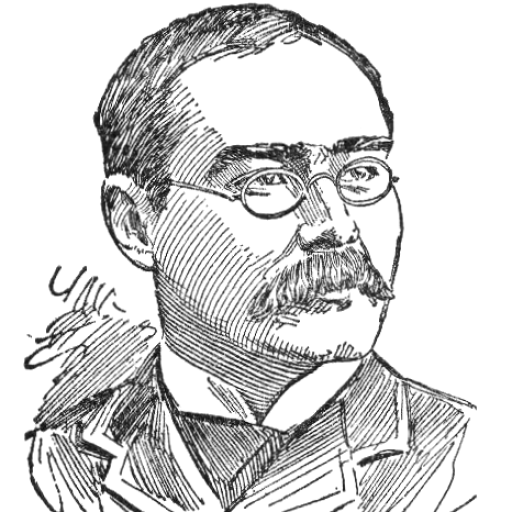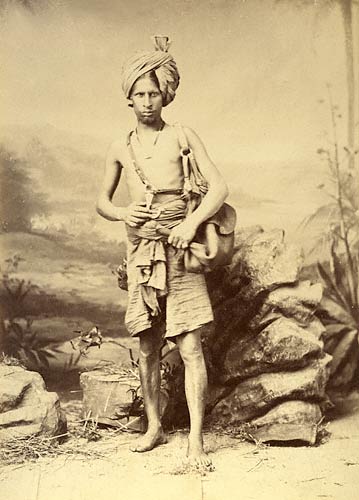You’re a better man than I am, Gunga Din!
This is rightly one of Kipling’s most famous poems. Gunga Din’s example brings home the message that the important thing about a person is his character, not his social position.
The narrator of this poem is an uneducated British soldier, used to think of local people as “them blackfaced crew”; but at the end he is moved to recognize that “you’re a better man than I am, Gunga Din!”
The poem is based on the true story on an Indian water-carrier called Juma, who served with “the Guides” at the siege of Delhi in 1857 during the Sepoy Revolt.
Gunga Din
You may talk o' gin and beer When you're quartered safe out 'ere, And you're sent to penny-fights and Aldershot it; (1) But when it comes to slaughter You will do your work on water, An' you'll lick the bloomin' boots of 'im that's got it. Now in Injia's sunny clime, Where I used to spend my time A-servin' of 'Er Majesty the Queen, Of all them blackfaced crew The finest man I knew Was our regimental bhisti, Gunga Din. (2) He was "Din! Din! Din! "You limpin' lump o' brick-dust, Gunga Din! "Hi! Slippy hitherao! (3) "Water, get it! Panee lao, (4) "You squidgy-nosed old idol, Gunga Din." The uniform 'e wore Was nothin' much before, An' rather less than 'arf o' that be'ind, For a piece o' twisty rag An' a goatskin water-bag Was all the field-equipment 'e could find. When the sweatin' troop-train lay In a sidin' through the day, Where the 'eat would make your bloomin' eyebrows crawl, We shouted "Harry By!" (5) Till our throats were bricky-dry, Then we wopped 'im 'cause 'e couldn't serve us all. It was "Din! Din! Din! "You 'eathen, where the mischief 'ave you been? "You put some juldee in it (6) "Or I'll marrow you this minute (7) "If you don't fill up my helmet, Gunga Din!" 'E would dot an' carry one (8) Till the longest day was done; An' 'e didn't seem to know the use o' fear. If we charged or broke or cut, You could bet your bloomin' nut, 'E'd be waitin' fifty paces right flank rear. With 'is mussick on 'is back, (9) 'E would skip with our attack, An' watch us till the bugles made "Retire," An' for all 'is dirty 'ide, 'E was white, clear white, inside When 'e went to tend the wounded under fire! It was "Din! Din! Din!" With the bullets kickin' dust-spots on the green. When the cartridges ran out, You could hear the front-ranks shout, "Hi! ammunition-mules an' Gunga Din!" I shan't forgit the night When I dropped be'ind the fight With a bullet where my belt-plate should 'a' been. I was chokin' mad with thirst, An' the man that spied me first Was our good old grinnin', gruntin' Gunga Din. 'E lifted up my 'head, An' he plugged me where I bled, An' 'e guv me 'arf-a-pint o' water green. It was crawlin' and it stunk, But of all the drinks I've drunk, I'm gratefullest to one from Gunga Din. It was "Din! Din! Din! "Ere's a beggar with a bullet through 'is spleen; "E's chawin' up the ground, "An' 'e's kickin' all around: "For Gawd's sake git the water, Gunga Din!" 'E carried me away To where a dooli lay, (10) An' a bullet come an' drilled the beggar clean. 'E put me safe inside, An' just before 'e died, "I 'ope you liked your drink", sez Gunga Din. So I'll meet 'im later on At the place where 'e is gone - Where it's always double drill and no canteen. 'E'll be squattin' on the coals Givin' drink to poor damned souls, An' I'll get a swig in hell from Gunga Din! Yes, Din! Din! Din! You Lazarushian-leather Gunga Din! Though I've belted you and flayed you, By the livin' Gawd that made you, You're a better man than I am, Gunga Din!
Notes
[1] Sent to minor military engagements and carry them out like the training exercises at Aldershot, the large British military base near London.
[2] ‘Bhisti’ – Indian water carrier.
[3] ‘Slippy hitherao!’- Come here!
[4] ‘ Panee lao!’ – Bring water!
[5] ‘Harry By’ – O, brother!
[6] ‘Juldee’ – Hurry.
[7] ‘Marrow’ – Hit.
[8] ‘Dot and carry one’ refers to the operation (in addition or subtraction) of setting down the units and carrying over the tens to the next column; here it refers figuratively to Din’s serving water to unit after unit, and moving on to the next column.
[9] ‘Mussick’ – water-skin.
[10] ‘Dooli’ – A stretcher for transporting the sick or wounded.

